Advertisements
Advertisements
Question
Probability
The following statements express varying degrees of certainty. Look at the underlined modals in each of the statements. Then number the sentences in order of certainty. Mark the sentence No. 1 if it is most likely certain and the least likely as no. 5.
(a) The lady in the formal attire may be Mr. Chawla’s secretary. (a) ___________
(b) The foreigners accompanying him could be the (b) ___________ newly appointed interpreters
(c) The man in the safari talking to someone on the (c) ____________ cell phone mustbe Mr. Chawla.
(d) Mr. Chawla will be the chief guest. (d) ___________
(e) The people following him might be from the media. (e) ___________
Solution
(1) The people following him might be from the media.
(2) The lady in the formal attire may be Mr. Chawla’s secretary.
(3) Mr. Chawla will be the chief guest.
(4) The foreigners accompanying him could be the newly appointed interpreters.
(5) The man in the safari talking to someone on the cell phone mustbe Mr. Chawla.
APPEARS IN
RELATED QUESTIONS
A story can have more than one ending. Rewrite the end of the story you have just read. You can begin like this…….. “As he drove home, he felt guilty for having let his children down. He reached home, entered the house and saw his wife and children watching the television…”
Answer the following question briefly.
Which road does the speaker choose? Why?
The poet could not understand the words of the song, yet he raised several
possibilities about its theme. In the chart below are some of these possibilities.
Read the third stanza again, and find the phrase that matches each. Complete the
chart, by writing a phrase in each of the empty boxes. Work in pairs.

Answer the following question.
"I am like earthly life … "
Why does the poet compare rain to earthly life?
(а) Mohan comes in wearing overalls and is covered in paint.
(i) _______________________________________
(ii) _______________________________________
(b) Ramesh comes in with a smile on his face. He is holding a trophy.
(i) _______________________________________
(ii) _______________________________________
(c) Monica returns home with lots of packets in her hands.
(i) _______________________________________
(ii) _______________________________________
(b) Sheela comes in with red eyes and a wet handkerchief.
(i) _______________________________________
(ii) _______________________________________
Edit the following narrative by choosing the appropriate word from the options given at the end of the paragraph.
(a) Wander along the streets of New York City, my daughters and (b) me stop at shoe stores wherever we (c) happens to be. This is their choice. These women, who as little (d) girl, teetered around the house (e) balances like cranes in my mother’s high heels. I (f) sits on the bench and wait while they try on shoe (g) on shoe readjusting their positions in (h) a mirror, eyes downcast considering their feet.
“So?” one of them (i) will ask me. “What do you think of these?” “I love them,” I say about (j) all pairs.
| (a) (i) wandered (ii) wandering (iii) were wandering (iv) was wandering |
| (b) (i) they (ii) I (iii) we (iv) us |
| (c) (i) happen (ii) happened (iii) are happening (iv) are happened |
| (d) (i) girls (ii) woman (iii) boys (iv) people |
| (e) (i) are balancing (ii) is balancing (iii) balanced (iv) balance |
| (f) (i) sit (ii) am sitting (iii) sat (iv) was sitting |
| (g) (i) after (ii) before (iii) in (iv) by |
| (h) (i) that (ii) the (iii) their (iv) x |
| (i) (i) is asking (ii) asks (iii) are asking (iv) asked |
| (j) (i) every (ii) few (iii) some (iv) a |
Work in pairs. You and your partner are made in charge of your school. What will you change?
Discuss and then write about the decisions you would make.
Use the various verb forms available for future time reference.
e.g. Now we are in charge of the school, we shall…
Rearrange the following words and phrases to form meaningful sentences. The first one is done for you as an example. Write the answers in your answer sheet.
are / the / dreams scenarios/picture perfect houses/not a speck of dust/and no cobwebs ever/with a wrinkle-free bedcover/on the shelves
Picture perfect houses with a wrinkle-free bedcover, not a speck of dust on the shelves and no cobwebs ever are the dream scenarios.
(a) of its residents/becomes a/it reflects/a house/the personality/home when
(a) _______________________________________
(b) has to look/no rules/how our/there are/as to/home
(b) _______________________________________
(c) thing is/ inhabiting them/should enjoy/the important/that we
(c) _______________________________________
(d) about/houses are/our lives/personal statements
(d) _______________________________________
(e) the confidence/in ourselves/they reflect/we have
(e) _______________________________________
(f) we have/will be/the more/ individualistic/confidence/the more/our homes 00
(f) _______________________________________
Look at the pictures of people talking to each other. With your partners, discuss what they are telling each other. Share your ideas with the class.
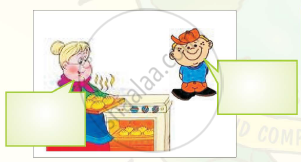
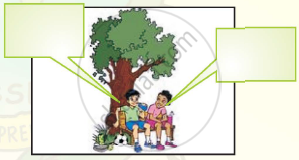
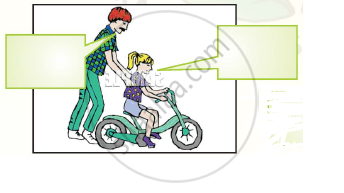
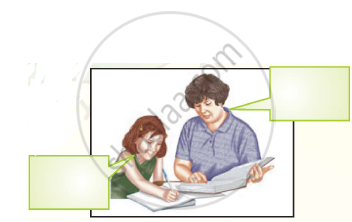
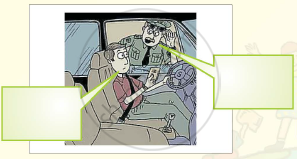
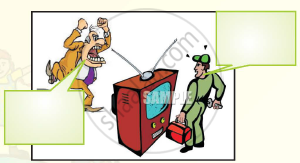
Think of a person in your class, and use adjective + prepositions to describe him/her in about two or three sentences. Don't give a name.
(a) e.g. She’s good at Maths.
She’s keen on hiking.
Show your description to your partner. Let her or him guess who it is.
(b) The following diagram explains the use of some of these prepositions.
| Destination | Position | Destination | Position | Reference |
| to •X | at •X | away from x ⇒ |
away from x • |
Referring to a |
| on (to) | on | off | off | Referring to a line or surface. |
| into | in | out of | out of | Referring to an enclosed area |
Notice the following peculiarities in the use of Prepositions.
1) at relates to a small extent of space or time while in relates to a wider extent.
2) with relates to the instrument used for doing something.
by relates to the doer
e.g. (1) This poem was composed~me
(2) I wrote with a Shaffer's pen.
3) between, among: between is used when there are two things or persons or
ideas, among is used for more than two.
e.g. ( 1) The property was divided between the twins.
(2) The gossip spread among the villagers.
4) beside, besides : beside means by the side of, besides means in addition to
e.g. (1) Ram sat beside his grandmother.
(2) Besides music, he is interested in painting.
5) in and within : in denotes at the close of some future period, within denotes
sometime short of the close
e.g. (1) The project will be implemented in a week's time.(= at the close)
(2) The plan will be sanctioned within a fort night(= less than)
